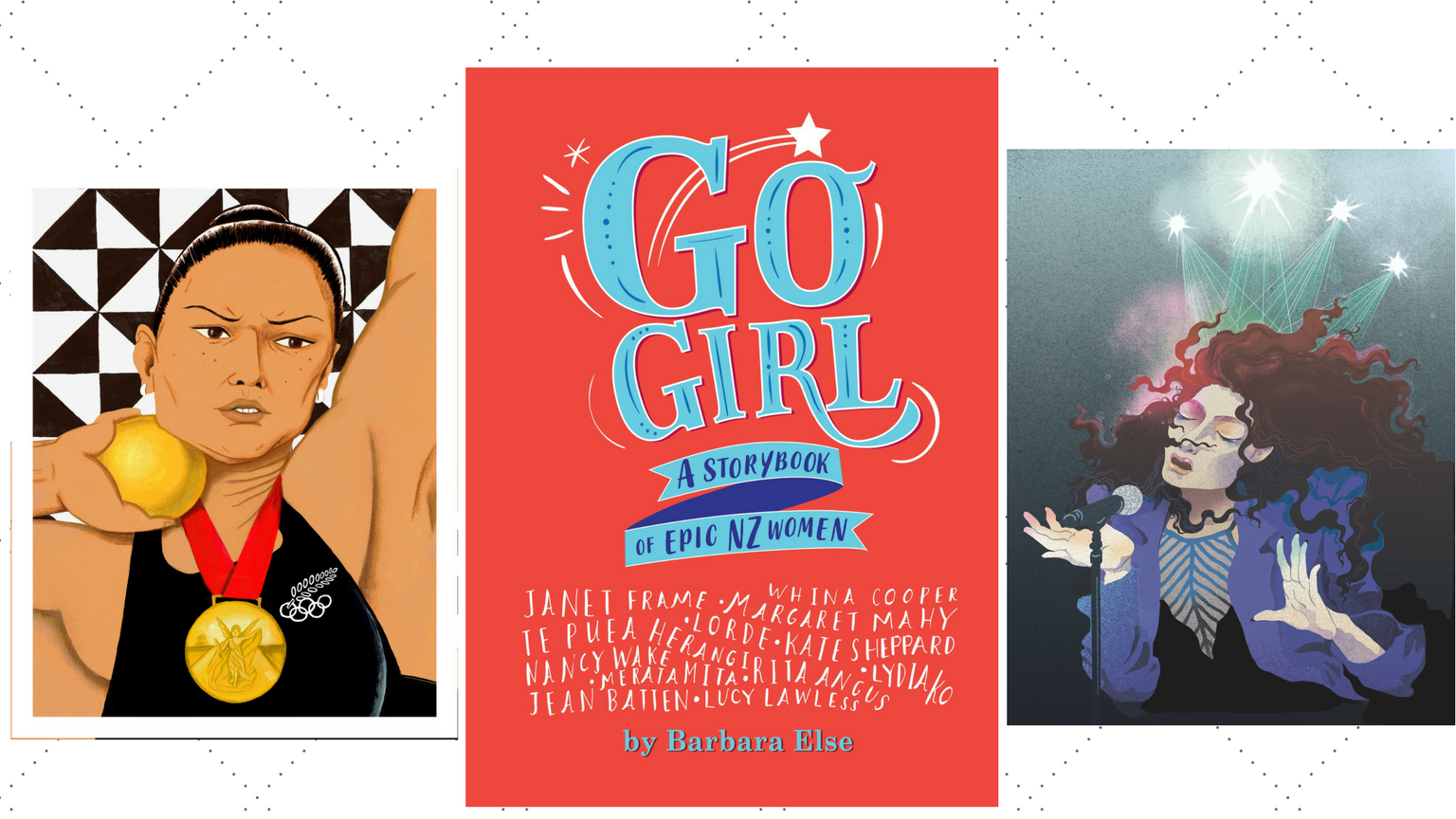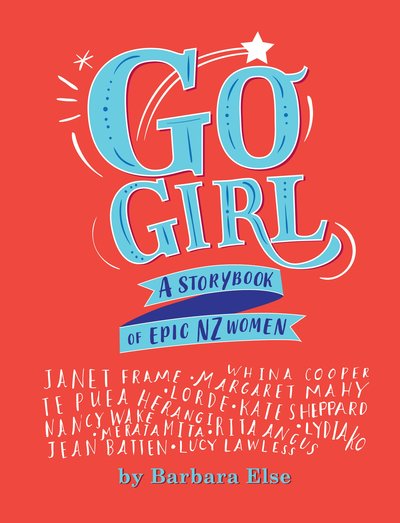You will have seen our Sampling, you have seen why it needed to be written. Now, here’s the verdict on Go Girl: A Storybook of Epic NZ Women. Is it everything it promises to be? Emily Writes is here to tell you what she and her children thought.

After the phenomenal success of Goodnight Stories for Rebel Girls it seemed only a matter of time before we would have a New Zealand version of the book of heroes.
In Go Girl: A Storybook of Epic New Zealand Women by Barbara Else we have that, but it actually feels like more than just a ‘version’. Go Girl feels like a companion, every bit as beautiful as the original.
Go Girl feels like a companion, every bit as beautiful as the original.
There will be comparisons of course, so off the bat I’ll say I prefer this version. Barbara Else’s words feel more accessible than those in Rebel Girls.
That could be because I felt a deeper connection with the places and people I know of as New Zealanders. But I do think it’s also that Else writes of all different types of success, with clear and concise messages for children that go beyond conventional views of achievement. The story on Beatrice Faumuina isn’t just the story you know (that of an incredible athlete), it is a story of the loss of her coach Miriam and how she now coaches others to be their best.
Else’s stories have lovely turns of phrase and imagery that kept my kids interested, for example Lisa Tamati’s Death Valley ultramarathon is a favourite, with ‘If you break an egg on a stone it fries in seconds’.
Each story is perfectly paired with an illustration by one of nine stunningly good New Zealand illustrators including the shockingly talented Sarah Laing (I want to put her image of Dame Whina Cooper on my wall).
Each story is perfectly paired with an illustration by one of nine stunningly good New Zealand illustrators …
Go Girl, like all books of this nature, work best when they launch conversations. It has definitely achieved this aim. We talked about exactly what the ‘troubles’ of Bastion Point were after reading the story of Merata Mita, and Tainui land confiscation after reading the story of Te Puea Herangi. There were interesting discussions about being a missionary and why fighting the Government is a good thing.
I have read Rebel Girls for some time to my boys. I let them pick an illustration they like and then I tell that woman’s story. To be honest, they tend to like the illustrations most – they have the shortest attention spans known to man and seem to be turned off by the lengths of the stories.
I haven’t had that problem with Go Girl – my son has been completely captivated by the stories of Ahumai Te Paerata and Dame Mira Szászy, Farah Palmer and the other incredible Māori women featured.
He was most excited about Georgina Beyer as they share the same iwi – ‘She’s my family!’ he said. ‘She’s a Māori like me from the same Māori family!’
He was most excited about Georgina Beyer as they share the same iwi – ‘She’s my family!’ he said. ‘She’s a Māori like me from the same Māori family!’
We are learning Te Reo as a family and I source books about Māori legends and featuring Māori characters but I realised I’ve never read stories of inspirational Tangata Whenua to them. It made me consider my parenting of them – as a Pākehā mum – and where the gaps are and how I can work on these.
My son swells with pride every time he looks at the stunning picture of Georgina Beyer by Rebecca Ter Borg. The conversation we had about Georgina led to a search of people from his iwi and their achievements. He knows about Nunuku-whenua and Sir Māui Pōmare, but the context in which we talk about them isn’t the same as the way these profiles celebrate tenacity and generosity. He is now creating his own little book starring Miriama Kamo, Te Rangi Hīroa and ‘my nanna’.
One of the criticisms I’ve heard of these books is they should say they are for ‘all children’ [read this as: boys] in the title. I don’t really buy this. A title shouldn’t stop you from purchasing a book you know will be beneficial for your children to read and the reasons that we need a book about inspiring women (despite there being more inspiring women than men in the world) shouldn’t be ignored.
A title shouldn’t stop you from purchasing a book you know will be beneficial for your children to read and the reasons that we need a book about inspiring women … shouldn’t be ignored.
But – I think the truth of these lovely stories is that they give what is needed to the reader, whoever the reader is. And we can’t always know what that is when we first open its pages. I have found this book so inspiring as a woman, and through reading it to my children I have felt inspired by it as a mother. My sons have had a completely different, just as inspiring, take on it. Your child will too.
If you have little girls, it will hopefully encourage them to know they can break rules and fight for what is right even if it’s frowned upon – and that’s obviously so important in this misogynist society they’re growing up in.
Parris Goebel’s story is a great example of rewriting a fairytale. But anyone would be inspired by her story. Any child growing up in Manurewa, trying to fit into school when it’s not for them can read that and feel uplifted and know that they too can dance to their own tune. They might see that a teacher has said about them what was said about Parris – and that may be the hook that tells them – this could be me too. I can be someone who leads in my community.
Maybe they’ll read Mai Chen’s story and feel an affinity with a young girl who once only knew two English words in a strange country – or maybe they’ll see themselves in Mavis Rivers from beautiful Apia and say ‘this is where my journey has begun too’.
You don’t need to be a little girl to be inspired by these stories, to see yourself, to see a possible future. Whatever that future might be.

Go Girl: A storybook of epic NZ women
By Barbara Else
Published by Penguin Random House NZ
RRP $45.00

Emily Writes
Emily Writes is a mum of two, a columnist, an activist, a volunteer, a writer and a friend. She is currently making a living from her online newsletter (Emily Writes Weekly) subscriber base. She is also the director of Awhi Nga Matua – a charity supporting parents of disabled and medically fragile kids.



